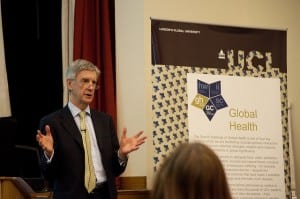“Lives are on the line”: TB research can’t survive without the Global Fund
By news editor, on 2 April 2012

 TB research has changed over the past 10 years. Growing collaborations have led to huge advancements in testing and treatment for a disease that kills every 20 seconds.
TB research has changed over the past 10 years. Growing collaborations have led to huge advancements in testing and treatment for a disease that kills every 20 seconds.
But this progress is threatened by reduced financing of health programmes by the Global Fund, which accounts for two-thirds of global TB funding, leaving money only for ‘essentials’.
“Lives are on the line,” said Simon Logan, a policy advisor from the All Party Parliamentary Group on Global Tuberculosis, who is now urging the public to engage in dialogue about the potential impact that Global Fund restrictions will have on the disease.
The challenge of TB
World TB Day, held on 24 March, marks 130 years since Robert Koch discovered the bacteria responsible for the disease. The ‘UCL ‘Local and global’ TB conference last week coincided with a TB supplement in the Journal of Infectious Diseases – this year, the focus is paediatric TB. There are major challenges to tackling the disease and many are particular to children. These include under-reporting of cases, diagnostic difficulties and the need for better quality drugs.
Many countries don’t even report national TB rates according to Haileyeses Getahun (WHO STOP TB Partnership) and even fewer include children.
Luis Cuevas (Liverpool School of Tropical Medicine) highlighted that the reliance upon sputum for diagnosis (which is notoriously difficult to get from children) means that millions of cases are missed. We don’t know the scale of the problem, about drug resistance or how to evaluate new drugs and vaccines – this all affects funding.
In a compelling talk, Nathan Ford (head of the South Africa Medical Unit, MSF) claimed that more than half of high TB-burden countries have poor access to good quality TB-drugs: “We need to pressure the market; the more manufacturers there are, the lower the price will become.”
But there are barriers to licensing novel drugs tested against indirect outcomes (e.g. urine-antigens) as opposed to sputum smears – this means that children miss out.
TB alliances and new technologies
It’s not all bad news. There are some exciting new research collaborations afoot and important diagnostics being developed.
Sir John Tooke spoke incredibly highly of the new alliances within the UCL infection, immunology and inflammation theme, UCL Partners and the upcoming Francis Crick Institute, which brings scientists together for common problems such as TB. “But it’s not about ivory tower research; it’s about getting research into practice”.
Prof Ali Zumla (UCL Infectious diseases) seeks to harness the capacity of these networks to generate “out of the box thinking”. It is outrageous that TB kills two million a year despite there being a treatment for the past sixty. “We have to question what we’re doing and why we’re doing it. Question the dogma”, he added.
Susan Swindells (Medical Director, University of Nebraska Medical Center) introduced some groundbreaking new TB diagnostics.
These included a urine test that looks for antigens as an indirect TB-marker; the amazing African Giant Pouched Rat that can identify the disease from breath alone and genetic approaches such as Cepheid’s ‘Gene Xpert’, which is easier to use than your average espresso machine…although it is also prohibitively expensive at $17 per test. This is currently being rolled out in South Africa, at a discount.
The role of politics
Crucially, recent TB alliances have engaged senior levels of government to effect policy change, truly bridging the gap between research and practice.
The roll-out of ‘Xpert’ for TB diagnosis in South Africa is largely attributed to the South African Health Minister who was persuaded to use the machine: “If a minister can do it, it can’t be that hard,” he reportedly said.
If we can get politicians interested, the results can be incredible and worrying all at once…I can’t help but wonder about the sustainability of such a costly approach and the effect on other aspects of the health system.
In the UK Professor Zumla works alongside Baroness Masham of Ilton in the All Party Parliamentary Group (APPG) for Tuberculosis, allowing parliamentarians to strategise and hold the UK government to account about TB policies.
n her considered speech, the Baroness emphasised the importance of an active APPG to keep the disease at the top of the agenda: many people in parliament think it has “gone away”.
It is catastrophic that the Global Fund has been so dramatically reduced. The UK “stands ready” to increase its contribution and is in a rare position as a leader in TB funding.
You can become a part of a ripple effect by contributing to the dialogue about this important issue and encourage other countries to increase their pledges. Your involvement is welcomed by the APPG: http://appg-tb.org.uk/.
Written by Jenny Saxton, PhD student in the UCL Centre for International Health and Development.
Images: Professor Ali Zumla (top) and Professor Sir John Tooke speaking at the conference.
 Close
Close

